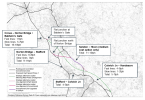HSTEd
Veteran Member
- Joined
- 14 Jul 2011
- Messages
- 16,825
It's unlikely you would use a hybrid bill process for a few hundred metres of curve.The Phase 2a alignment crosses the Stone to Colwich line pretty much at right angles. A junction between the two would therefore require a substantial section of new route, with the delays caused by design, public consultation, Hybrid Bill enactment and land acquisition. Is that really likely to cost less than just completing 2a under the existing powers?
It would likely be approved under a Transport and Works order process, as similarly sized projects on the conventional railway are.
And completing HS2A will cost many billions of pounds (the exact price for delivery is obviously uncertain), so yes, it would certainly be cheaper. Even HS2 puts the price at £5.2-7.2bn, and I'm not sure I'd bet on much less than ten at turnout.
Last edited:

